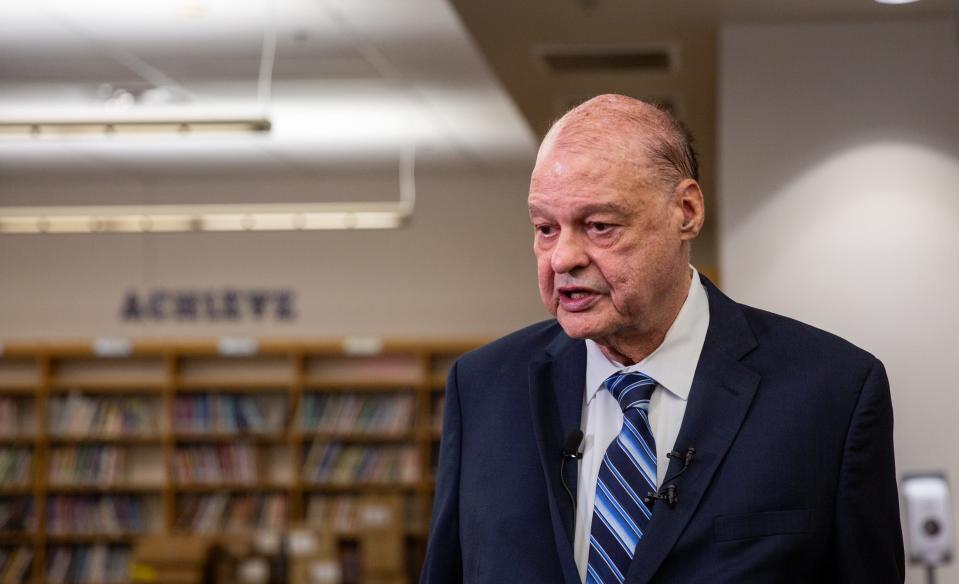Categorical ban from school sports games unfair to trans kids, lawyers argue
On Monday, a U.S. District Court judge in Tucson heard arguments on whether to temporarily allow two transgender girls, ages 11 and 15, to try out for girls’ sports teams at their schools while a lawsuit challenging Arizona’s year-old law barring transgender girls from competing on girls’ teams proceeds.
Attorneys for the two girls and their families told Judge Jennifer G. Zipps they oppose the sweeping, categorical exclusion of transgender girls from girls' sports teams.
In their legal challenge, the students seek to restore power to the entities that previously determined who was allowed to play on sports teams and compete, schools and the Arizona Interscholastic Association, a regulatory body that oversees high school athletic competition in Arizona.
The lawsuit was filed in April by the girls' parents and names Superintendent of Public Instruction Tom Horne as a defendant in his official capacity, as well as the Arizona Interscholastic Association, The Gregory School, the Kyrene School District and Kyrene Superintendent Laura Toenjes in her official capacity. It claims that the law passed in 2022 barring trans girls from competing on girls' school sports teams violates the U.S. Constitution's Equal Protection Clause, Title IX, the Americans with Disabilities Act and the Rehabilitation Act.
Plaintiff Megan Roe, 15, was a member of her school's girls’ volleyball team last year but could not participate in interscholastic competition because of the law. Volleyball matches at The Gregory School, the private school in Tucson she attends, are an "important social occasion, which are well-attended by the school community," according to court filings, and she wants an equal opportunity to compete on the volleyball team this school year.
Plaintiff Jane Doe, 11, has played soccer on girls' club and recreational teams for nearly five years and wants to try out for the girls' soccer, cross country and basketball teams when she starts at Kyrene Aprende Middle School in Chandler this year, according to court filings.
The plaintiffs, who use pseudonyms in the lawsuit, will be "deprived of the social, educational, and physical and emotional health benefits that come from school sports" if the defendants are permitted to enforce the ban against them, the girls' attorneys said in court filings.

Being deprived of these benefits, which include making friends, physical fitness, developing a sense of belonging, improved academic performance and learning how to regulate emotions, is enough to constitute irreparable harm, argued Amy Zimmerman, one of the plaintiffs' attorneys present at the hearing. But the ban also inflicts other injuries, like being stigmatized and ostracized because of characteristics over which the girls have no control, she said.
Zipps has not yet decided on the girls' request for a preliminary injunction.
The basics of the lawsuit: Tom Horne heads to court to defend transgender school sports ban. What to know
Plaintiffs' lawyers: Being trans is not an accurate proxy for athletic ability
The plaintiffs' attorneys argued that the ban is subject to intermediate scrutiny, a level of judicial review used to test a law's constitutionality that requires the law to further an important government interest by substantially related means. While safety and fairness in girls’ sports can be important state interests, argued Amy Whelan, an attorney for the plaintiffs, “they are not substantially related, or even related at all,” to Arizona’s categorical ban of all transgender girls from girls’ teams.
Being transgender is not an accurate or reliable proxy for athletic performance, she argued.
There is a scientific consensus, plaintiffs' attorneys argue in court filings, that the "biological driver of average group differences in athletic performance between adolescent girls and boys is differences in their respective levels of testosterone, which begin to diverge significantly only after the onset of puberty."
Due to their treatment for gender dysphoria, a diagnosis that describes a feeling of discomfort or distress that might occur in an individual whose gender identity differs from their sex assigned at birth or their body, Jane and Megan have not experienced the "physiological changes that increased testosterone levels would cause in a pubescent boy," according to court filings.
Jane hasn’t yet started puberty and will soon begin receiving puberty blockers. Megan has been receiving puberty-blocking medication since she was 11 and began hormone therapy when she was 12. She has developed "physiological changes associated with puberty in females," according to court filings.
"Simply knowing a girl is transgender tells you absolutely nothing about that girl's athletic performance or ability," Whelan said. Zimmerman also argued there is no inherent relationship between a person’s anatomy and genes at birth and their future athletic ability.
Whelan argued that if the defendants were concerned about safety and fairness, they would not even allow trans girls to participate in practice, which arguably creates more chances for injury and unfairness because they occur much more frequently.
Zimmerman said that it's important to look at real-world experience and cited the fact that a very small number of trans athletes have been approved to play on sports teams that match their gender identity in Arizona in recent years, saying that the idea that those students are "somehow making girls' sports unsafe or unfair," or depriving other girls of opportunities to play "defies any logic or reason."
The Arizona Interscholastic Association approved 16 requests from transgender athletes to compete on sports teams that align with their gender identity between 2017 and 2022, according to testimony by Kristina Wilson, the chair of the association's Sports Medicine Advisory Committee, during a March 2022 legislative hearing. The association oversees athletics for around 170,000 students, Wilson said.
When asked by Zipps to address the argument from the defendants that Jane and Megan aren't precluded from participating in sports because they're able to participate on boys' teams, Zimmerman responded by stating that that's not how courts look at this issue, citing the 2013 Latta v. Otter federal case from Idaho, which challenged the state's ban on same-sex marriage. In that case — after an argument was made that the law didn't harm same-sex couples because they could marry people of the opposite sex — there was a recognition that sexual orientation and gender identity are immutable, and individuals should not be forced to forego them, she said. Competing on boys' teams would also directly contradict Jane and Megan's medical treatment for gender dysphoria, which includes living as girls in all aspects of their lives, she said.
In response to arguments from the defendants that the plaintiffs could play on co-ed sports teams, Whelan said that this is not practical because there are very few competitive co-ed teams available in Arizona, and legally, "we would also never accept this separate but equal logic."
To succeed with their request for a preliminary injunction, the plaintiffs must show they are likely to win their case and that enforcement of the ban in the meantime would cause irreparable harm. Zimmerman argued that the 9th U.S. Circuit Court of Appeals and courts across the country have held that where a violation of the Constitution or a civil rights statute is likely, there is a presumption of irreparable harm.
Horne claims puberty-blocking is irrelevant in suit

The key issue in this case, said schools Superintendent Horne, is whether "pre-puberty boys have an advantage over girls." He contends that they do and therefore the use of puberty-blocking medication is irrelevant.
At Monday's hearing, Horne's attorney argued that the plaintiffs failed to show that pre-puberty cisgender boys have no inherent physiological advantage over cisgender girls of their age and also failed to demonstrate that puberty blockers given at the onset of puberty clearly eliminate the advantage. Plaintiffs' attorneys argued that there's no evidence that trans girls on puberty suppression medication or hormone therapy have athletic advantages over cisgender girls, and there's no medical reason to assume that an advantage would exist, according to court filings.
Arizona Senate President Warren Petersen, R-Gilbert, and House Speaker Ben Toma, R-Glendale, were not named as defendants in the lawsuit but filed a motion to intervene to defend the ban after Arizona Attorney General Kris Mayes, a Democrat, disqualified herself from defending it.
On behalf of Petersen and Toma, Gregory Brown, a professor of exercise science in the Department of Kinesiology and Sports Sciences at the University of Nebraska at Kearney, submitted a declaration stating that "prepubertal male children perform better in almost all sports than equally aged, trained, and gifted ... prepubertal female children because of their inherent physiological advantages." Though boys' physiological and performance advantages increase rapidly from the onset of puberty, he said in court filings, he cites Presidential Fitness Test data, which was widely used in schools from the 1950s to 2013, and a number of other studies to contend some advantages do exist before puberty. The plaintiffs argued that after controlling for factors like age, location and socioeconomic status, researchers found no statistical difference in the capabilities of girls and boys until high school. Whelan said during the hearing that defense counsel acknowledged that the key factor, the divergence in testosterone levels, begins during puberty.
In a rebuttal on behalf of the plaintiffs, Dr. Daniel Shumer, a pediatric endocrinologist and the medical director of the Comprehensive Gender Services Program of a University of Michigan children's hospital, argued that Brown relied on "demographic data from physical fitness tests or athletics in which there's a small difference in performance between prepubertal non-transgender boys and prepubertal non-transgender girls." He said this data "merely observes phenomena across a population sample in isolated areas and does not determine a cause for whatever is observed."
"There is no reliable basis for Dr. Brown to attribute those small differences to physiology or anatomy instead of other factors, such as greater societal encouragement of athleticism in boys, greater opportunities for boys to play sports, or different preferences of the boys and girls surveyed," he argues.
Justin Smith, the attorney representing Petersen and Toma, argued that Title IX addresses "biological sex, not gender identity." The plaintiffs' attorneys argued that the 2020 U.S. Supreme Court case Bostock v. Clayton County decided that laws that discriminate against transgender people are sex-based.
Regarding the plaintiffs' claims that the ban violates the Constitution's equal protection clause, which states that similarly situated groups must not be denied equal protection under the law, Smith argued that trans girls and cisgender girls are not similarly situated and that under the ban, "the Legislature has made the determination that all biological boys will be treated the same."
Whelan argued that trans girls are similarly situated to cisgender girls. The plaintiffs "are legally female" and identify and live as girls, she said, "yet the law treats them differently from other persons who are legally female."
Based on the argument that trans and cisgender girls aren't similarly situated, Smith also disagreed with the plaintiffs' argument that intermediate scrutiny should be applied. Instead, he argued that the rational basis test should be used, a less strict test that requires the Legislature to have a reasonable and not arbitrary basis for the law. Whelan, the plaintiffs' attorney, argued that all gender-based classifications warrant intermediate scrutiny.
At the conclusion of the hearing, Zipps decided to take the preliminary injunction motion under advisement. She is also considering The Gregory School’s motion to dismiss the plaintiffs’ claims against it, which was also argued at Monday's hearing. The Tucson private school argued that it's not subject to Title IX because it does not receive federal funding, while the plaintiffs contended that its status as a 501(c)(3) tax-exempt organization constitutes federal funding.
Madeleine Parrish covers K-12 education. Reach her at mparrish@arizonarepublic.com and follow her on Twitter at @maddieparrish61.
This article originally appeared on Arizona Republic: Lawyers present arguments in Arizona transgender sports ban lawsuit

